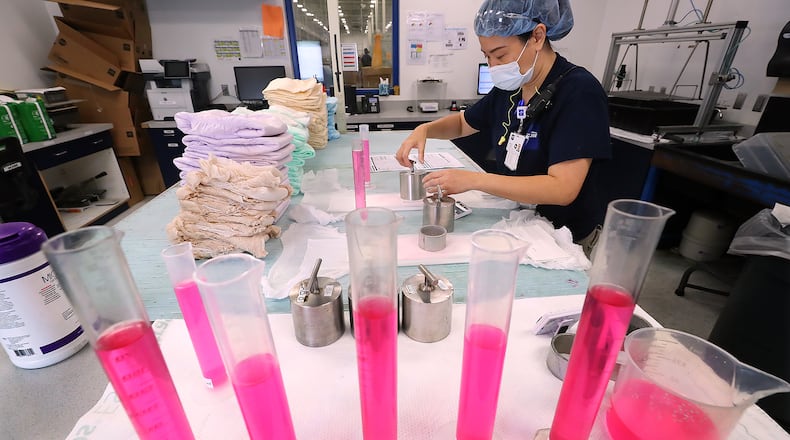Fewer hours for the store, more for the employees. That’s one way to deal with a shortage of workers, but definitely not the only one.
For Batteries Plus, it means opening later than usual and closing earlier, while employees work several hours a week overtime, said Patrick Schmalz, director of operations for the retailer, which does battery, phone and other repairs in three metro Atlanta stores with plans to open three more.
The stores have six open positions, he said. “We are so shorthanded, I am picking up shifts myself. It is not that I do not want to pick them up. I love being in our stores, but it is hard to do that and other things I need to do.”
But like many area businesses, Batteries Plus sees few job applicants, he said. “And only one of four who make appointments for an interview even show up.”
Workers are harder than usual to find because — despite more than a year of fairly steady growth — the workforce is still smaller than before the pandemic. Nationally, the gap is 3.1 million. In Georgia, the differential is about 37,000 workers.
The state has several hundred thousand job openings, according to Mark Butler, Georgia’s labor commissioner. “This is a unique and different situation. We have never had this many jobs sitting open.”
The problem is most intense at the lower end of the income spectrum in jobs that require customer contact, like at restaurants and stores. Not only is pay often meager, but front-line workers face greater health risks as COVID-19 circulates and the state’s vaccination rate lags.
Goodwill Industries, with about 3,200 jobs, the largest not-for-profit employer in the state, runs a string of stores selling used clothing and other items. With strong revenues, the staff is stretched thin, said Keith Parker, chief executive.
“We would like to add about 10% to our workforce,” he said.
It’s not that experts don’t have any explanations for the worker shortage, it’s that they have too many. People changing careers or starting their own business. Fear of the coronavirus. Retiring early. Child care challenges. Holding out for more money. Mismatched skills. Old-fashioned take-this-job-and-shove-it syndrome.
It started with the pandemic, said economist Tom Smith of Emory’s Goizueta Business School. “You’ve got to believe that this kind of a shock caused people to change.”
Amid a labor shortage, workers feel they have options, so they can be pickier than in years past. The rate of U.S. employees quitting jobs in August was the highest since the government started keeping track, according to the Bureau of Labor Statistics.
Credit: Curtis Compton / Curtis.Compton@
Credit: Curtis Compton / Curtis.Compton@
Whatever the reasons, businesses need to cope. They are reshaping operations around a shortage of workers, while offering potential hires a range of lures:
Raising wages. Paying more is the simplest response, one that ripples into other parts of a business. If payrolls expand, can a company save money in other ways, or can it pass along the higher costs to customers? If it pays more to new hires, how will current workers feel? Companies may need to look for ways to boost productivity down the line, but they need workers now.
Evans Tool & Die in Conyers, which has seen steadily growing demand, has been looking for engineers and press operators.
“We are investing in new machinery,” said Deanne Barnes, the company’s chief executive. “We raised wages to be competitive, even to keep the employees we have.”
Post-hiring incentives. Once an employer is on board, Evans Tool & Die provides profit-sharing. And many other companies also dangle benefits as a reason to take a job. Many offer bonuses for those who get hired or for current employees for referring people who get hired.
GXO Logistics, which is adding more than 1,100 jobs for the holiday season in metro Atlanta, is offering sign-on bonuses, higher wages and various “performance-based programs,” a spokesman said.
“It’s not all about the wage,” said Eric Narvaez, site director for the massive Radial Locust Grove fulfillment center. “We pay double-time for overtime. We do giveaways.”
Permanent workers receive health and dental coverage and help with school tuition, he said.
Flexible schedules and staggered hours. Scheduling has been a common workers’ complaint, since work soaks up time that could be used for family or other activities, often without much warning. The pandemic intensified those worries, making child care less reliable, so a company that caters to parents can reap benefits, said Travis Turner, sales operations director for e-commerce and supply chain at staffing company Hire Dynamics.
“Flexible shifts are huge right now in attracting people,” he said. “Now when (potential job applicants) come in, they’re telling us, ‘I want this pay, this shift, at this type of company. What do you have?’ And if you don’t have it, somebody out there that does will fill their job instead.”
While flexibility is tough on an assembly line, the 500-worker Medline Industries factory in Lithia Springs has a rotating four-day week, so every shift has some weekdays free each month. It’s not a new system, but Medline officials say they thinks it helps in attracting workers.
Streamlining services. Sometimes making things simpler can save costs, let workers be more productive and make training easier. Some restaurants have cut the number of items on their menus, reducing the need for more cooks, said Sean Palani, an Atlanta-based restaurant hospitality consultant.
About the Author
Keep Reading
The Latest
Featured



